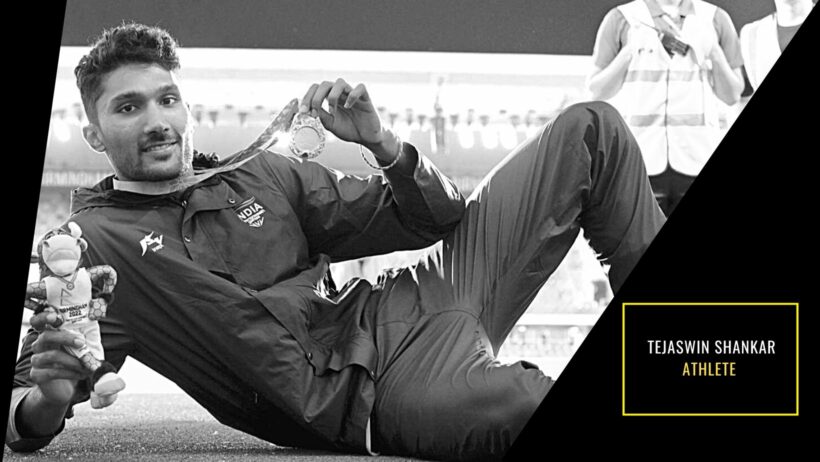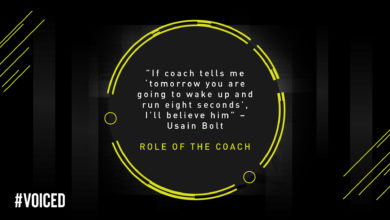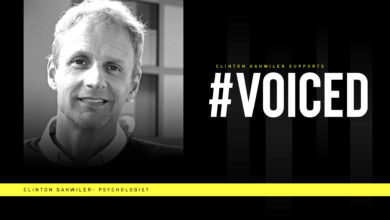Country: India
Profession: Athlete – High jump
Career highlights:
- 2022 Commonwealth Games bronze medallist
- 2022 NCAA Champion
- 2018 Commonwealth Games finalist
- 2016 South Asian Games silver medallist
- 2015 Commonwealth Junior Games gold medallist
- National record – 2.29m
What is the beauty of high jump for you?
High jump is a very interesting event. When I started doing high jump it was the one event that I didn’t really understand and one I never thought I would do. We didn’t have high jump facilities back in school and so it was all about running and long jump. So, I’m a late entrant into the event.
For me the beauty of high jump is that it was something that I’ve always felt was hard to do and when others saw me do it, they used to hype me up and make me feel as if what I’m doing is something truly impossible.
It is like when you see somebody running fast, you know they are running fast but you don’t know how hard it is until you really try it yourself. You may not really be in awe of them. But with high jump (and pole vault) I always thought you can be athletic, but you still can’t do it if you don’t have the technique. It is a weird thing to say, but that’s the one thing that really attracted me towards the high jump because I thought it was hard to do, and it was something that would make people watch.
I think that’s the beauty about the high jump; it’s a great event and it’s something that’s not natural and not instinctive. I think that is why I chose it and it’s fun to do.
Your Commonwealth bronze medal is India’s first ever in high jump, can you take us through that 2.22m jump?
On the day of the competition, I had so many thoughts, like “Do I even belong here?”. Trying to convince and motivate myself was a big task. I’ve had good jumps over the last 5-6 years, but I was never able to compete for my country due to various reasons. So, to be able to wear the uniform and compete for my country was something that really motivated me to give my best on that day.
I thought a 2,27m jump would probably be good enough for bronze, but I never thought that I would be able to achieve that at 2:22m. My whole thought process was to try to minimize the number of failures and make every mark on the first attempt, that’s the only reason I was able to get the bronze medal. The plan worked for me. I still feel that it was a low scoring high jump final because the weather got a little bit cooler on that day in Birmingham.
But with all that being said, I don’t really have words to describe the 2.22m jump because there’s so much emotion that comes with it. When I look back, I don’t really remember the jump…all I remember is that the feeling of relief and feeling 10kg’s lighter afterwards!
This being the first medal in the high jump for my country is sad, but at the same time I’m happy that I was able to achieve it at last.
You had to fight to compete at the Commonwealth Games even though you had met the qualification standards. What do you think needs to change if things are to be different going forward?
It’s probably not as simple as it sounds, there’s two sides of the story. My side was that I thought that I should compete because I had met the qualification standard. Their side of the story was that I didn’t compete at the national championships, which were also the selection trials. I didn’t compete at our home national championships because I wanted to compete in the NCAA championships and the dates clashed. I thought that was more important for me at that time because it was my last collegiate competition. My other argument was that nobody else had qualified or met the standard.
With all these issues my competing at the Commonwealth Games got really delayed, I didn’t know until a week to go that I was going to compete. That was really frustrating. I wanted to go, but at the same time I didn’t want to go one week before the competition only to underperform and embarrass my country. These were the thoughts that were constantly in my head even before I took my first jump.
To answer the second part of the question, I feel like the rules were a little hard to understand. It wasn’t set in stone that you have to compete at the national championships because some of the athletes got exemption as well based on various reasons. I still feel everybody should compete at the national championships and selection trials, that should be a mandate irrespective of who you are. The rules should be more transparent and clearer for everybody to decode.
Who was the first person you called after you won bronze?
The first person I called was my coach, who is based in Kansas. That’s where I was when I found out that I was not going to compete at the Commonwealth Games. I was really sad and my coach was able to console me and told me that there’s more to life than just one competition. He was able to get me to a point where I was ready to train and compete again because he knew that I was able (I had just jumped 2.27 a week ago), but at this point it was all about picking up my spirits and making sure that I was in a good headspace to continue training irrespective of whether I was going or not. He knew that if something comes up, I shouldn’t be in a position where I’m making excuses that I didn’t train for the last month because I wasn’t sure if I was going. Just like he predicted, I was selected for the Games and I was ready. So, he was the first person I called because I really felt that I owed it to him, and I was really happy that I was able to do it for all my family members as well.
What hidden talent do you have?
I don’t know if I have a hidden talent. I think I’m good with numbers. That’s something you might call a talent, but if you ask my family members they probably won’t agree because growing up I wasn’t really great in school. I had average grades; it was only after college that I really started to show more improvement in academics and that’s how I ended up doing my master’s in accounting and bachelor’s in finance. Apart from that I’m a very average bloke. I don’t really see anything that I’m talented with, but I feel like every Indian is talented in cricket and that’s something that I love to play and also watch. So maybe after I’m done with high jump, I can focus on being competitive as a cricketer.
What is your favourite place to visit when you are not training or competing?
My favourite place to visit is home. I moved to the US after I graduated high school and my goal was to make a living for myself and follow my dreams and not really depend on anybody. So, every opportunity I get, I spend time at home with family.
One thing I’ve learnt though is that once you start living by yourself, it’s really hard to go back home. After a week or two I start feeling like it’s time to go back to my own routine, I just feel like I’m overstaying my welcome and forget that it’s my own home. Nonetheless they always love having me over.
When are you at your happiest?
That’s a pretty deep question. I’ve realized that the biggest source of happiness for me is being with my family. Looking back to the Commonwealth Games situation, that is probably when I really understood that, because when times were tough, and I really needed somebody or something to pick me up that is when my family came in. That’s when I realized that’s why I do this, it’s not about the medal or the pride that comes with it but it’s about seeing them happy. And I guess they are happy when I’m happy. I feel like that’s what made me the happiest at that time. Even now when I look back, I feel like I’ve learned that through tough times and good times, it’s the family that makes me the happiest.


